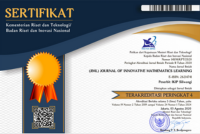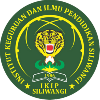The Implementation of Constructive Approach to Improve Students' Problem Solving Ability and Self Concept Ability
DOI:
https://doi.org/10.22460/jiml.v7i1.18586Keywords:
Problem Solving Ability, Self Concept Ability, Constructive ApproachAbstract
References
Alam, S. 2019. “Higher Order Thinking Skills (HOTS): Kemampuan Memecahkan Masalah, Berpikir Kritis Dan Kreatif Dalam Pendidikan Seni Untuk Menghadapi Revolusi Industri 4.0 Pada Era Society 5.0 | Prosiding Seminar Nasional Pascasarjana (PROSNAMPAS).†Pascasarjana UNNES 2 (1): 790–97. https://proceeding.unnes.ac.id/index.php/snpasca/article/view/372.
Assabanny, M Najiyuloh, Iyan Sopian, Heris Hendriana, and Luvy Sylviana Zanthy. 2018. “Penerapan Pendekatan Open-Ended Untuk Meningkatkan Kemampuan Pemecahan Masalah Matematik Siswa Mts.†JPMI (Jurnal Pembelajaran Matematika Inovatif) 1 (4): 637. https://doi.org/10.22460/jpmi.v1i4.p637-646.
Cahyani, Hesti, and Ririn Wahyu Setyawati. 2016. “Pentingnya Peningkatan Kemampuan Pemecahan Masalah Melalui PBL Untuk Mempersiapkan Generasi Unggul Menghadapi MEA.†PRISMA, Prosiding Seminar Nasional Matematika, 151–60.
Chintia, Murni, Risma Amelia, and Nelly Fitriani. 2021. “Ruang Sisi Datar.†Jurnal Pembelajaran Matematika Inovatif 4 (3): 579–86. https://doi.org/10.22460/jpmi.v4i3.579-586.
Hakim, Lukman. 2018. “Pengembangan Media Pembelajaran Pai Berbasis Augmented Reality.†Lentera Pendidikan : Jurnal Ilmu Tarbiyah Dan Keguruan 21 (1): 59–72. https://doi.org/10.24252/lp.2018v21n1i6.
Hasan, Ummi Rofika, Fitriani Nur, Ulfiani Rahman, Suharti Suharti, and Eka Damayanti. 2021. “Self Regulation, Self Esteem, Dan Self Concept Berpengaruh Terhadap Prestasi Belajar Matematika Peserta Didik.†ANARGYA: Jurnal Ilmiah Pendidikan Matematika 4 (1): 38–45. https://doi.org/10.24176/anargya.v4i1.5715.
Latifah, Teli, and Ekasatya Aldila Afriansyah. 2021. “Kesulitan Dalam Kemampuan Pemecahan Masalah Matematis Siswa Pada Materi Statistika.†Journal of Authentic Research on Mathematics Education (JARME) 3 (2): 134–50.
Maulina, D. 2022. “Pengembangan Model Discovery Learning Dengan Model Group Investigation Pada Mata Pelajaran Bahasa Indonesia.†Lingua Franca: Jurnal Bahasa, Sastra, Dan …, 199–211. http://journal.um-surabaya.ac.id/index.php/lingua/article/viewFile/8532/5357.
Nastiti, Faulinda, and Aghni Abdu. 2020. “Kajian: Kesiapan Pendidikan Indonesia Menghadapi Era Society 5.0.†Edcomtech Jurnal Kajian Teknologi Pendidikan 5 (1): 61–66. https://doi.org/10.17977/um039v5i12020p061.
Naufal, Hanif. 2021. “Model Pembelajaran Konstruktivisme Pada Matematika Untuk Meningkatkan Kemampuan Kognitif Siswa Di Era Merdeka Belajar.†Seminar Nasional Pendidikan Matematika 2 (1): 143–52.
NCTM. 1386. Principles and Standars for School Mathematics.
Okta Marika, Desi, Saleh Haji, and Dewi Herawaty. 2019. “Pengembangan Bahan Ajar Dengan Pendekatan Pembelajaran Santifik Berbantuan Geogebra Untuk Meningkatkan Kemampuan Spasial.†Jurnal Pendidikan Matematika Raflesia 4 (2): 153–63. https://ejournal.unib.ac.id/jpmr/article/view/9777.
Retnowati, Endah. 2010. “Pendidikan Matematika Realistik : Sebuah Tinjauan Teoritik.†Jurnal Pendidikan Matematika 1 (2): 73–94. doi: 10.18592/jpm.v1i2.97.
Sabri, Indar. 2019. “Peran Pendidikan Seni Di Era Society 5 . 0 Untuk Revolusi Industri 4.0.†Seminar Nasional Pascasarjana 2019 2 (1): 342–47. https://proceeding.unnes.ac.id/index.php/snpasca/article/view/302.
Sari, Siti Maryam, and Heni Pujiastuti. 2020. “Analisis Kemampuan Komunikasi Matematis Siswa Ditinjau Dari Self-Concept.†Kreano, Jurnal Matematika Kreatif-Inovatif 11 (1): 71–77. https://doi.org/10.15294/kreano.v11i1.22717.
Siti Aisyah, Nurul, and Luvy Sylviana Zanthy. 2019. “Analisis Kemampuan Berpikir Kreatif Matematik Dan Self Concept Siswa Mts Pada Materi Himpunan.†Journal On Education 1 (3): 252–59.
Subekti, I, and S Andriani. 2022. “Model Pembelajaran MURDER (Mood, Understanding, Recall, Digest, Expand, Review) Berbantuan Media Gamifikasi Dan Self Concept: Dampak Terhadap ….†GAUSS: Jurnal Pendidikan … 05 (01): 37–49. https://e-jurnal.lppmunsera.org/index.php/gauss/article/view/4726%0Ahttps://e-jurnal.lppmunsera.org/index.php/gauss/article/download/4726/2058.
Widana, I Wayan. 2021. “Realistic Mathematics Education (RME) Untuk Meningkatkan Kemampuan Pemecahan Masalah Matematis Siswa Di Indonesia.†Jurnal Elemen 7 (2): 450–62. https://doi.org/10.29408/jel.v7i2.3744.
Yuwono, Timbul, Mulya Supanggih, and Rosita Dwi Ferdiani. 2018. “Analisis Kemampuan Pemecahan Masalah Matematika Dalam Menyelesaikan Soal Cerita Berdasarkan Prosedur Polya.†Jurnal Tadris Matematika 1 (2): 137–44. https://doi.org/10.21274/jtm.2018.1.2.137-144.
Zulfan Hanif Rahman, Reni Setyaningsih2. 2019. “Meningkatkan Kemampuan Pemecahan Masalah Siswa Melalui Pendekatan Realistic Mathematics Education†11 (2): 1620–29.
Downloads
Published
Issue
Section
License
Copyright (c) 2023 (JIML) JOURNAL OF INNOVATIVE MATHEMATICS LEARNING

This work is licensed under a Creative Commons Attribution-ShareAlike 4.0 International License.
The author is responsible for acquiring the permission(s) to reproduce any copyrighted figures, tables, data, or text that are being used in the submitted paper. Authors should note that text quotations of more than 250 words from a published or copyrighted work will require grant of permission from the original publisher to reprint. The written permission letter(s) must be submitted together with the manuscript.
























